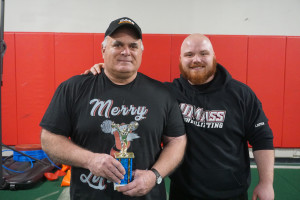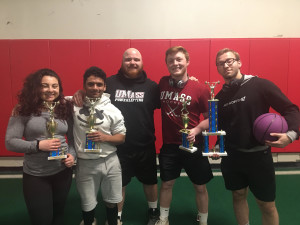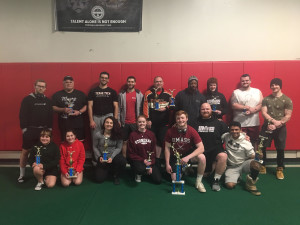Being a Coach…. Also Known as A Mentor.
By Christopher Lestan
As lifters, athletes, and even as individuals we all go through different types of coaches. Some coaches we never want to talk to again. Some we consider as parents. Some even as role models. Now, in my opinion, a mentor is someone who instills values through activities they demonstrate or organize. They are the people who can inspire a person who just hit rock bottom to come out on top within a few weeks. They make the effort to make a connection that will aide them to instill morals and lessons. I find coaches as the best mentors in my personal opinion. In a generation where social media dominates the landscape of popularity, and perception of life it’s often difficult to find genuine coaches who are able to be mentors. People who actually care for the athletes or individuals they coach, and often give life advice to them whenever they are down. That is when it matters. The ability to create a connection that will last years after even when the sport they participated in ended.
My first experience of bad mentors was through hockey. Now I completely understand that hockey is a tough sport were coaches often scream at their kids until they respond and commit to the action that the coach wanted. I will never understand the action of crushing a kid’s dream. Often at these “power skating” sessions is where little kids would learn the basic foundations of a perfect stride in hockey. It was there I got the taste of horrible mentorship. I loved hockey and wanted to play college after high school. However, the coaches there always said that I never would because I never played select hockey ( the private league for youth hockey players). So I decided to try it. When I got there the coaches still instilled I would never play college due to the inability to be part of a select hockey team sooner than now. It was no surprise that I quit hockey soon after.
The next experience was all the same when I played football, and the coaches told me I couldn’t play college or even start varsity unless I was 6 foot and 300 pounds. Now, this was a 5’8″ stout 230-pound kid who was done growing they were telling this too. So safe to say football didn’t last long for me. They also didn’t inspire and when kids failed the coaches often told them that it was “their fault and their choices that brought them this failure”. Now, this may connect with a few kids, but often most kids do not want to aid that coach that called them a failure.
Lacrosse (Yes I did play lacrosse at my size believe it or not) was when I experienced my first mentor. I was a freshmen goalie in high school with not high expectations for sports since hockey and football never panned out as I wanted too. My father told me to walk on the varsity team but due to the previous experiences, I had no desire to really try at lacrosse. Two months later my freshmen coach tells me to head to the varsity practice. In my head I was saying “why!” but of course I responded with “yes no problem”. On a hot summer day in June, and out of shape, chubby, 240 pounds 5’8″ lacrosse goalie shows up to varsity practice. Immediately a man who looked like he could run 4 marathons and not be tired still sprints to me and says “Hey, my name is Coach Z, and I heard awesome things about you” shakes my hand and before I could respond yells at the whole team “TIME FOR CONDITIONING”. My heart skipped a beat, due to the word conditioning, and what seemed like in 10 seconds I was doing bleacher sprints. After what seemed like 2 hours (it was really 20 mins I soon found out) we were in full gear getting ready to scrimmage each other.
Soon I was taking shots that were between 80-90 mph to the face, body, legs, and arms. I felt shell shocked partly due to the fact on the freshmen team no one shot above 75 mph and now that was chump change. I remember making a few great saves that I wouldn’t expect myself to save, and my team actually won the scrimmage. After the dust settled and everyone started to unpack their equipment Coach Z came up to me and looked me in the eyes and said: “Great job kid you were really impressive”. He was saying this to the same 5’8″, 240 pounds, stout, chubby, out of shape kid that walked into practice in the beginning. I ended up staying with the varsity and even played a game for them.
Two years later I was in the rotation for Varsity as a goalie. He would text me in the off-season to make sure I was working hard, and practicing for the next season. Even if I was the backup on varsity I still knew I had a role to play. I knew I needed to bring my A-game to make sure the starting Goalie we had practiced harder to ensure his starting position. My senior year was when I got the nod to start. We had a very good season, came in 4th in the state, made All-State, and I even broke a couple of school records.
Now besides the accomplishments of myself, none of it would have happened if it wasn’t for Coach Z. He always had a saying before big games in which he would look us in the eyes and say “Be great… Only you can control that”. That stuck with me all 4 years in high school after I met him. He wasn’t a coach that told you were good even when you weren’t. He wasn’t going to yell at a mistake you made in a game. He wasn’t going to put blame on a player in front of kids or even tell us we suck. He wanted us to understand that we are great, but only if we wanted to be. If we made a mistake he told us to get back up and get back out there in a stern voice. We didn’t fear mistakes, for we understood we had to make them to be great. We as players have the option to be terrible, good, okay, or great. We controlled our destinies. It was him telling us he had full faith in what we can do as a team, and how much control we had in a making a season a great one. It worked. Throughout the season we would simply dominate teams that were way more talented than us on the simple fact we wanted to win more, and we wanted to make him proud.
He was also put in an effort to be close to his players. Often he would say on senior year of lacrosse to not drink and drive from a party, don’t make stupid decisions that would affect other people, and if all else to call him and he would help you in any situation. He wanted his players to be safe, and make intelligent decisions as grown men. He wouldn’t baby us and cradle us, but again expect us to be smart with our actions. He loved us as players and as people and would help anyone that needed help. In turn, his players would do the same.
Now, that’s what I call a coach who knows how to mentor. He allowed us to control our fate’s senior year. He also made us push ourselves in drills to the limits simply because we wanted to win. Also, the ability to develop relationships with players that evoke us to care for him because he cared for us. I remember we would scrimmage till the sun was setting and we refused to stop the practice. I wouldn’t be that good of a Goalie if didn’t believe in myself. He instilled values and morals that we didn’t even know he placed within us. The best part about this is that we still meet up every couple of months to get a beer and talk about our lives! That’s a mentor.
The impact that these people have can last forever. This is what makes kids into great people. These are the people who learn life lessons from sports, and morals are soon developed. Never crush a kid’s dream. Always have them push. Life is never easy and thus learning this will instill great pride within themselves! They can use what they learned through failure, and success to the real world where they can become great leaders.
Therefore, as the title of the article states great coaches are mentors. They allow the people they coach to start believing in themselves. The ability to inspire a young group of kids is a true talent. When the belief becomes a reality that is when the person is a force to be reckoned with. I’m sure we can all relate to a point in our lives when in training we started to believe in our ability to lift a certain weight. That’s when we become unstoppable. The ability to walk up to something and then say to yourself ” I will do it” is the most powerful tool known to mankind. For coaches who stress this into their players, and athletes who in return use this tool… that is when that coach has become a mentor. The mental state is fragile but once it is harnessed to its full capability there is only progress. In return, I feel like I would do anything for Coach Z. If he was in a situation and needed help he can rely on his players to be there for him.
Coach Z was my first mentor in my athletic career and I can’t thank him enough for what he has taught me. Make sure you say thank you to your mentors whenever you have a chance.
And of course…. be a coach….but also a mentor.


